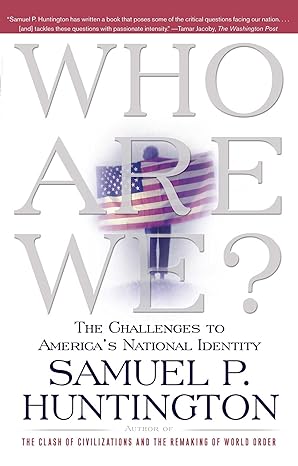
“Who Are We? The Challenges to America’s National Identity,” is a work of scholarship that deserves utmost respect. It asked all the right questions and proceeded with some of the most provocative answers yet. They seem trivial, such as how many Americans put up the Star and Spangled flag on September 11th, and how many failed to put them up again ten years later. Was this a sign of a decline in American patriotism? Indeed, not many political scientists would deign to frame the question(s) guided by such antics. But Samuel Huntington, who has since passed on, was able to use these as his “optics” to understand the American ‘mind.’
Invariably, Samuel Huntington argued that America could evolve in five directions. One, a creedal America, where everyone believes in US’s founding and common principles; as provided by the Bills of Rights and the US Constitution. Two, America evolves and changes according to the values of its immigrants; primarily an influx of second and third generation Mexicans. Three, white chauvinism and racism stage a full return. Four, the values of the ethnic minority are given further leeway and respect. Five, all of the above, occur at the same time; giving America the flavor of a “melting pot.”
Samuel Huntington, however, argued that America would be at its best, if it protects its Anglo-Saxon culture. He made a distinction between Anglo-Saxon culture and Anglo-Saxon people though; thus avoiding the conceptual confusion of misreading the two. America should defend its Anglo-Saxon culture, but not necessarily the Anglo-Saxon people. By defending Anglo-Saxon culture, which stands for the importance of English language, freedom, democracy and accountability, America would be what President Ronald Reagan called the “beacon of light upon the shiny hill.”
The problem with such an assertion is the demography at work. Anglo-Saxon culture can only be maintained and perpetuated with some intensity if the Anglo-Saxon population is growing. It is not. Hence, the burden of defending Anglo-Saxon culture would be passed to immigrants. Now, this is a tall order. Immigrants who come to the United States can respect some of the attributes of the Anglo-Saxon culture. But if the Anglo-Saxon culture presupposes the need to defend it with some martial ethos, as Samuel Huntington argued in the “Clash of Civilizations” that precedes “Who Are We”, then the immigrants would be placed in a moral and strategic conundrum. To be an American would be to fight like Americans in the past.
If part of becoming America is the ability to “go to war” or literally “die for America,” then what is the point of coming to America to have a better life? This is the finer point that Samuel Huntington could not answer, nor did he try. Born and bred in the United States, with all the privileges entitled to a white American, who received his tenure at Harvard University as early as 1956, Samuel Huntington could not connect with the disparate lives of others in America, despite making a powerful appeal to defend it.
Indeed, as the recent election showed, Republicans have stormed back to control the presidency, Senate and House of Representatives , and will soon nominate justices that can pack the Supreme Court with Republican conservatives. The politics of self-entitlement pioneered by President Donald Trump has begun, and is only the tip of the iceberg. Such movements can gain traction precisely because of books by the likes of Samuel Huntington. They create the discourse of insecurity and fear; that the “remnants” of Anglo-Saxon are under siege, and their need to take back the ‘citadel’ of the United States.
At the rate at which this is happening, the US far right can only embolden the far right in other countries that have blamed immigrants and foreigners for the aftereffects of automation and globalization. Indeed, if one were to read this book parallel to Amy Chua’s “World on Fire,” one can understand how some scholars, in their search for originality, often produce books and scholarship that hinder inter-communal hybridization.
